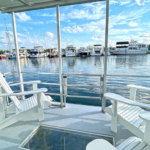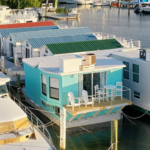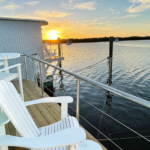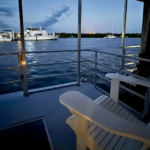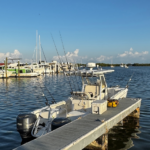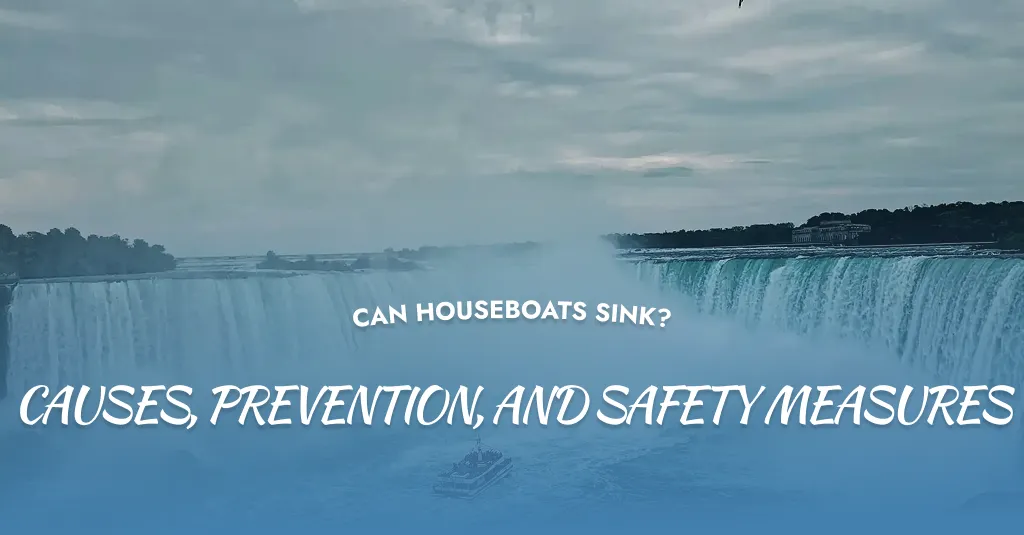
Can Houseboats Sink? Causes, Prevention, and Safety Measures
Houseboats are known for offering a peaceful and adventurous lifestyle on the water. Whether you’re living full-time on a floating home or enjoying a short vacation on a rental boat, you may wonder: Can houseboats sink?
It’s a valid concern and the answer is yes, houseboats can sink under certain conditions. However, with proper maintenance, awareness, and safety protocols, sinking is rare and mostly preventable.
In this blog, we’ll break down what causes houseboats to sink, how you can prevent it, and the safety measures every boater should know before stepping onboard.
Can Houseboats Sink?
The simple answer: Yes but it’s uncommon.
While modern houseboats are engineered for safety and stability, they’re still watercraft. Like any vessel, if a critical failure occurs such as a leak, hull breach, or weight imbalance sinking is possible.
But the good news is: most incidents happen due to neglect or preventable issues.
Common Causes of Houseboats Sinking
Understanding the main causes helps houseboat owners and renters protect against disaster.
1. Hull Damage or Leaks
Just like any boat, a houseboat relies on a watertight hull to stay afloat. If the hull is cracked or punctured, due to impact, poor maintenance, or aging materials water can slowly flood in.
2. Faulty Plumbing or Water Lines
A leaking water pipe or broken connection in the onboard plumbing system can go unnoticed for hours. Over time, the water accumulates and causes the boat to sit lower or tilt, which may lead to partial or full sinking.
3. Poor Weight Distribution
Houseboats must be balanced. Uneven placement of furniture, appliances, or water tanks can create listing (leaning to one side), increasing the risk of water intake during rain or waves.
4. Heavy Rain or Flooding
If the houseboat isn’t sealed properly or lacks an efficient bilge system, heavy rainfall can cause water to collect inside the boat. Without drainage, it may lead to dangerous levels of water accumulation.
5. Mooring or Docking Accidents
Collisions with docks, sharp rocks, or other vessels can cause structural damage, especially to the hull. In severe cases, this can open a leak below the waterline.
6. Lack of Maintenance
The number one cause of avoidable sinking is negligence. Failing to inspect bilge pumps, hull integrity, or onboard plumbing regularly can leave small problems unnoticed until it’s too late.
How to Prevent a Houseboat from Sinking
The good news? With the right precautions and routine upkeep, the chances of your houseboat sinking are extremely low.
Here’s how to stay safe:
1. Inspect the Hull Regularly
-
Check for cracks, blisters, or signs of wear and tear.
-
Look for water lines inside the hull that indicate previous flooding.
-
Repair damage immediately to prevent water entry.
If you store the boat seasonally, inspect it both before and after docking.
2. Maintain the Bilge Pump System
A bilge pump removes unwanted water from the boat’s bottom. Make sure:
-
It’s working correctly.
-
The battery or power source is functional.
-
The float switch is free of debris.
-
There’s a backup system in case of primary pump failure.
3. Monitor Plumbing and Water Lines
Plumbing leaks can be silent but deadly.
-
Check under sinks and behind walls for leaks.
-
Inspect water tanks and hoses regularly.
-
Use marine-grade fittings that resist corrosion.
4. Balance the Weight Properly
Distribute the weight of furniture, appliances, fuel, and passengers evenly. Avoid loading one side heavily, and never exceed the recommended weight capacity of your boat.
Tip: Keep heavy equipment low and centered.
5. Secure the Boat in Bad Weather
During storms or strong winds:
-
Double-check mooring lines.
-
Use fenders to prevent hull damage.
-
Close all windows, hatches, and doors.
-
Avoid cruising if weather warnings are in effect.
6. Consider Floatation Devices or Pontoons
Some modern houseboats use pontoon-style hulls that provide added buoyancy. You can also install additional floatation foam to help keep the boat afloat in emergencies.
7. Regular Professional Inspections
At least once a year (or before major trips), hire a marine surveyor or boat technician to assess:
-
Hull condition.
-
Seals and gaskets.
-
Electrical systems.
-
Floatation stability.
What to Do If Your Houseboat Starts Taking On Water
Despite your best efforts, issues may still arise. Here’s how to respond calmly and effectively:
1. Don’t Panic
Stay calm. The first few minutes are critical. Assess the water source.
2. Activate the Bilge Pump
Turn on the pump immediately to remove excess water. If your pump is manual, start pumping right away.
3. Locate and Patch the Leak
Use a temporary leak patch kit or marine sealant to plug holes. If the leak is due to a pipe or hose, shut off the water supply.
4. Call for Help
If you’re unable to stop the flooding, contact local marina staff, coast guard, or emergency services. Many houseboats have marine radios for emergency use.
5. Move People to Safety
Evacuate passengers if necessary. Use life jackets, and secure valuable items in waterproof bags.
Are Certain Houseboats Less Likely to Sink?
Yes! Some designs are inherently safer than others.
Pontoon Houseboats
Multiple pontoons add stability and buoyancy, making them very hard to sink.
Floating Homes
These are built on fixed or semi-fixed platforms and rarely leave the dock making them highly secure against sinking (unless a major flood occurs).
Catamaran-Style Houseboats
With two hulls and wide beams, they offer excellent balance and are less likely to capsize.
Do Houseboat Rentals Pose a Risk of Sinking?
Very unlikely. Reputable rental companies perform regular inspections and maintenance to ensure their boats are safe, balanced, and fully equipped with bilge pumps and emergency gear.
However, always:
-
Ask about safety protocols.
-
Request a walk-through before setting off.
-
Check for life jackets, fire extinguishers, and first aid kits.
Should You Worry About a Houseboat Sinking?
Can houseboats sink? Technically, yes. But in reality, sinking is rare especially with routine maintenance, smart usage, and safety practices.
Houseboats are built to withstand water, weight, and time. Most incidents occur due to avoidable errors, not design flaws. As long as you follow the guidelines in this post, you can enjoy your floating lifestyle or vacation stress-free.
Whether you’re planning to buy a houseboat, rent one for a trip, or live onboard full-time, remember: a safe boat is a well-maintained boat.
Frequently Asked Questions (FAQs)
Can a houseboat capsize in bad weather?
It’s rare. Most houseboats are designed for stability, but strong storms and poor mooring can cause listing or leaks. Always secure your boat and avoid severe weather.
Do all houseboats have bilge pumps?
Most do, especially modern models. It’s essential for keeping the boat dry and safe. Always verify before buying or renting.
What should I do if I notice a leak?
Act fast: turn on the bilge pump, locate the leak, apply a temporary fix, and call for help if needed.
How often should I inspect my houseboat?
Basic checks should be done monthly. A professional inspection is recommended annually or before long journeys.
Are insurance policies available for sinking?
Yes. Boat insurance typically covers sinking due to accidental or sudden causes. Be sure to review your policy details.

